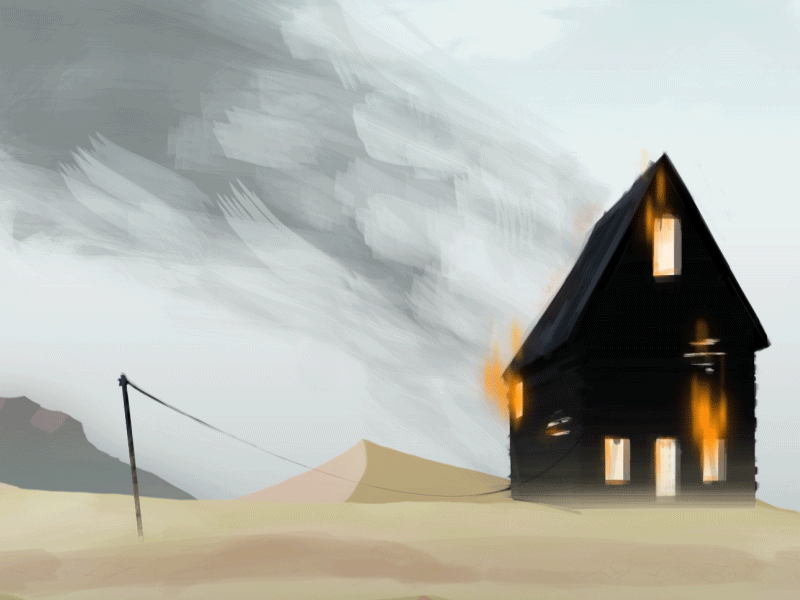


Owning a house next to a cliff edge is at risk of falling into the sea.. Thinking of buying a house close to a cliff edge, maybe it's at a good price please think again..England has some of the fastest eroding coastline in Europe, particularly along the Norfolk and Yorkshire coasts. Historical records show that England's soft and sandy east coast has always been subject to retreat. The numerous lost villages beneath the North Sea are testament to this.12 Oct 2022


Houses are seen on the edge of a cliff after it collapsed in the village of Nefyn, North Wales, this week. Thursday 22nd April 2021
The house on the cliff edge
" The haunted house" built about 1885. The road leading to it was especially built to enable access to the house and was initially known as Seafield Road, later it became Merley Road.
During the war years the house was the accommodation for British officers, and the field became a prison for the Italians.
The house was built as a summer residence by Brinsley de Courcey Nixon (5 May 1825-18 April 1903), whose occupation was given on the 1881 census as a banker from London.
Taken with a Nikon D90

Shocked homeowners living above a huge landslide say they’re ‘devastated’ that the cliff fall has forced them to leave their houses. Tonnes of rocks collapsed onto the beach in Nefyn, near Pwllheli, North Wales, on Monday 19th April 2021, leaving homes at the top of the cliffs teetering on the edge. Dramatic pictures showed turf, paving and even garden furniture which had tumbled way down onto the sand following the landslip, which happened minutes after people had walked along the same beach. Investigators have since told residents to avoid the area while the cliffs are stabilised, with homeowners now worried their properties could disappear altogether. Local hotel owner Melvyn Jones is the only permanent resident on the row of houses now dangerously close to the cliff edge. Jones, 64, lives in a bungalow immediately next to the site of the landslide.

Melvyn Jones bought the property 10 years ago in 2011 and lives there with his wife, stepson and seven-year-old son. He told Yahoo News UK: “I’m devastated. I can’t do anything right now until I find out more from the council, but I don’t want to sell it - and who would want to buy a house on top of a cliff anyway? “My brother-in-law was in the house when it happened, doing some work for me. He rang me and said, ‘You’d better come home quickly - there’s been a landslide.’ I thought it was a joke. “It’s a lovely bungalow with views across the bay. There’s a farmer’s field a few hundred metres away which has had bits of cliff chipping away over the years, but nothing like this cliff fall has ever happened from under our house before."
Hotel owner Melvyn Jones, whose house backs onto the landslide, with wife Paula and son Harri. (Yahoo UK/Courtesy of the Jones family)

This drone image shows that a staggering amount of earth has broken away and down to the beach below endangering the houses along the seafront. Company director Nick Smith, 66, who owns a property which is closest to the edge of where the cliff fell apart, told Yahoo that a large section of the garden at the back of the property has fallen away. Red arrows point to Nick Smith's house, he has lost a staggering amount of his back garden and is most at risk of losing his home in the distant future..

Nick Smith ponders his thought's as he looks out over his back garden at the future erosion which could jeopardize his home..Nefyn, North Wales, before the cliff fall took away 13ft off his property, not forgetting the value of his property has now significantly decreased... (Yahoo UK/Courtesy of Nick Smith)

Nick Smith usually stays at the home, which once belonged to his late mother, twice a week throughout the year for work – and found out about the landslide shortly after it happened on Monday. He said: “I was shocked. My first concern was nobody on the beach was injured or killed. “After that, the extent of what damage had been done to the cliff. But it’s taken a section of the garden away at the back of the property.” Smith, who lives in Shropshire, said he has “not considered” selling the house while investigations into the incident take place. He said: “The main consideration at the moment is to assess the damage, what's got to be done to stabilise the cliff so that it won't go anymore and after we've got that we'll go onto any other decisions.”
This image is before the cliff collapsed down onto the beach and indicates that a large portion of the garden no longer exists..

It is not always possible for eroded and dangerous cliffs to be reinforced with concrete, boulders and other materials..Defending this entire coastline would be prohibitively expensive and destroy many of the things we love about the coast – few want to see boulders dumped on their local beach or large stretches of concrete wall. So instead of asking how UK coastlines can be “saved” from erosion, we need to instead consider how they can be managed in a sustainable, holistic way that protects people who live along the coast and allows them to adapt to change.

Another landslide happened in the same area around a month ago, according to North Wales Live. A resident sitting outside his beach house when the landslide happened told the website that he “wasn’t surprised at all” by what he saw, adding that landslides “happen all the time”. He added that a similar incident took place around six years ago, causing the pipe in a nearby house to burst. Jones said that a burst pipe or build-up of moisture could have been the cause of this weeks landslip. He said: “I think there’s been a build-up of water behind the cliffs - and if you look at how far the cliffs go into the sea there’s obviously something else wrong. “With the amount that came down, it must’ve been something which happened back inside the cliffs - it could’ve been to do with a burst pipe or something.”

Tragically, there was also a fatal cliff fall in Nefyn two decades ago. In January 2001, Shirley Race died when the car she was in with her husband Donald was swept over a cliff at Nefyn, narrowly missing a chalet below, before being swept into the sea. Donald Race was rescued but suffered serious injuries. The couple’s vehicle was one of seven engulfed by mud in the landslide, which was the third to take place in weeks. The cliff was thought to have been weakened by heavy rain and Gwynedd council officials looked into ways of making the area safer.
Tragedy struck Nefyn from another landslide in 2001, when several cars were caught in a cliff fall and a woman was killed. (Reuters)
Erosion is constantly reshaping coastlines as land is swept into the sea, sometimes along with buildings and infrastructure. The UK has some of the fastest eroding coastlines in Europe. Of the mainland’s 17,000km of coastline, around 2,900km (17%) is affected by erosion.

Erosion is a major issue, particularly in smaller towns and villages along the UK’s southern and eastern coasts. Barton-on-Sea, a small coastal town in Hampshire, is one such example where residents are worried about their safety due to landslides and high erosion rates. Several meters of frontage have crumbled into the sea and the entire seafront is now classified as highly vulnerable to erosion.


Why A Defiant Resident Refuses To Leave His Sinking Home
Norfolk's collapsing coastline: I won't give up my home that's falling into the sea | Times Reports

The former soldier Lance Martin 61, (pictured, outside his home) says that he's willing to put in the sea defences necessary to protect his property but has been told that doing so will violate planning rules..

But Lance has now been ordered to stop building his own sea defences by the local council which says he is breaking planning rules. Lance, who served in the British Army from 1978 to 2000, said: 'I looked at the tide tables and saw there were a lot of high tides coming up. I thought I've got to do something about this.' A major demolition of the chalet-type buildings was conducted by the council after the eroding coastline they were built on left them uninhabitable.
This is how badly Lance's chalet was hanging off the cliff in the aftermath of the storm. It faced falling off completely after the extreme weather battered his house. The property is pictured immediately after the extreme weather hit the coast in May this year 2023.

Lance asked the if he could fill in the holes left on the beach for public safety, but the council told him no. He said: 'The problem is that I've gone and done something that I should've applied for but because of the imminent danger to the building and myself, I took it upon myself to do what needed to be done. 'If not, we would be two or three months down the line and I would be in the sea on my way to Norway.' 'If I see something that needs doing, I will go ahead and do it. I just don't see the end because it's a committee for this, and a committee for that.'
But homeowner Lance managed to salvage his chalet, which he bought as a retirement property and has since been conducting his own work on his house ahead of the winter. However, the borough council has banned him from carrying out any more work involving the beach. Lance added: 'I know from speaking to the council that they have plans for coastal sea defences but that's going to take at least three years, which is no good to me or other residents. 'I knew there were about 50 concrete blocks under the sand outside my house. I decided off my own bat to go hire a digger, dig them up and use them to fortify my position here, to give myself protection from the high tides.' Lance said the concrete blocks ranged from two to three square metres, and weighed up to four tonnes each. With a friend, the former grenadier guardsman started moving the heavy objects on Thursday October 8, and took a week to get them all into position on the beach.
_png_gallery.jpg)
The former soldier has now miraculously saved his clifftop house from the wrecking ball after he dragged the home 10ft back from the cliff edge with a JCB. Ex-soldier Lance Martin struggled for more than 24 hours to move the wooden house using huge diggers.
On Thursday afternoon March 16th 2023, the former soldier raised his arms to celebrate his win as he noticed the first movement. A "high noon" deadline was issued to the former Grenadier Guard by Great Yarmouth Borough Council officials.He was told that if the contractors failed to move the house significantly by 12pm, the council would have to consider issuing a demolition order. Unwilling to get his house demolished, Lance’s rangled together a group of friends, neighbours and contractors with the men toiling all yesterday and this morning to get the wooden structure to shift. However, none of them saw any ray of hope until Wednesday evening as the house did not move a single inch. A key breakthrough came after the team realised that a concrete plinth under part of the house was impeding movement.

On Thursday afternoon March 16th 2023, the former soldier raised his arms to celebrate his win as he noticed the first movement. A "high noon" deadline was issued to the former Grenadier Guard by Great Yarmouth Borough Council officials.He was told that if the contractors failed to move the house significantly by 12pm, the council would have to consider issuing a demolition order. Unwilling to get his house demolished, Lance’s rangled together a group of friends, neighbours and contractors with the men toiling all yesterday and this morning to get the wooden structure to shift. However, none of them saw any ray of hope until Wednesday evening as the house did not move a single inch. A key breakthrough came after the team realised that a concrete plinth under part of the house was impeding movement.
A jubilent tired but relieved Martin Lance acknowledges success as his house is pulled back from the brink by JCB Diggers.
"Now we have shown it can be moved, we can make proper arrangements to put the house across the road once we've cleared the site, which will hopefully give me the time I need." A council official, who had arrived at the property around noon, made his way back down the road after seeing the house moving. To keep the workforce going, his friends from the Beach Café kept a supply of croissants and bacon rolls as the morning wore on. Mr Martin said: "These guys have been terrific and I'm so grateful to them and to the Pines for their help, as well as the local lifeboat crew who brought us the telegraph poles. "The whole community has helped with this."

The properties on the coast of Hemsby, Norfolk, have already spilt many of their contents out after being battered by severe weather. They will now be demolished due to the irreparable damage caused by the recent storms known as ‘the Beast from the East’. The photographs were taken by Mike Page, 78, who has been taking pictures of the UK’s eroding coast line for almost 50 years. Mike said: “It’s a tragedy for the people who lived in these houses – I don’t think the council will help them at all. “When I first started taking pictures, there was another entire row of houses between the ones that you can see and the beach itself. “What you can see is the result of gradual erosion – these cliffs aren’t protected, it’s a shame that these people are going to lose their homes. “There should be more effort made to protect these cliffs – people should be able to live here and in places like this without this happening.

Coastal erosion and loss of dwellings, Hemsby, Norfolk, UK in 2013.

Another house teeters on the edge of the cliff in Hemsby in Norfolk -Great Yarmouth Borough Council will be arranging for a demolition contractor to clear and remove the houses which were most affected. Among those left with no option but to leave was Maurice Broom, 74, who has watched his home – which he bought for £40,000 two years ago after his wife’s death – partially collapse on to the beach. Speaking as he gathered his belongings together, he said: “I had nine metres of garden five hours ago – now it’s gone. “I was 90 metres from the sea two years ago; now I’m a metre and a half away. I’m going to need a miracle. “I’ve got 20 minutes to gather my belongings and my five pets – one of them is blind, so this is the last thing I need.”


Redcliffe Road in Torquay has been dubbed the most dangerous street in Britain after one house fell into the sea and another was condemned after a series of devastating landslides


This shot of the cliff-top cul-de-sac shows the house at the end that has already tumbled into the sea, and a neighbouring house which is deemed to be at risk of the same fate. The homes are said to be worth up to £360,000, and were built in the 1930s offering breath-taking views across the English Channel. But over the last few months, landslides have turned one home into a heap of bricks and wood dangling over the cliff edge, while a neighbouring house has been deemed too risky to live in. The street has become so notorious, it is attracting crowds of tourists - many just children - curious to see the cul-de-sac that is falling into the sea.

Would you live here, This house was once worth £360,000. Torbay Council has now warned sightseers to stay away, for their own safety, and asked residents to work together to keep the gawkers out. A spokesman said: 'Following the recent collapse of a property and ongoing concerns about cliff stability we are taking steps to ensure public safety. 'This includes requiring owners of properties at the seaward end of Redcliffe Road to take appropriate measures to prevent access to adjoining land approaching the cliffs. The cliff-side view of the house that tumbled 150ft down to the sea - Torbay Council fear the rest of the houses are in danger of following suit

We would strongly advise parents to ensure their children do not go on to the private land and put their safety at risk.' A total of 100,000 tonnes of earth have come crashing down from Babbacombe's crumbling cliffs in recent months. The first house to fall victim was sprawling Ridgemont House, which has now almost completely disappeared over the edge. The mangled mansion became infamous because it was declared unsafe just one week after being sold at a blind auction. The six-bedroom pile was bought for £155,000 in February 2010 via a telephone bid by a woman from London who had never been there. Police officers in Devon and Cornwall say the influx of sightseers is not only dangerous, but adding to the anguish of those still living in the street's 16 remaining homes.

Police Constable Lee Metherell warned: 'Lots of youngsters are gaining access which will undoubtedly end fatally if we don't stop it. You can clearly see that one slip on the uneven ground will most certainly lead to your death. 'Please keep out if you don't want to die.' PCSO James Milton added: 'We just don't want a group of drunk kids going in their at night. 'The gardens have been totally undermined. One wrong foot in the dark and you're gone. I'm no geologist, but it looks as if there will be more movement.'

Another property to the right also risks collapsing into the sea 150 feet below. The houses in Redcliffe Road were built 90 years ago so residents could enjoy far-reaching views across the English Channel.

Fail: Landslip demolished £1.5 Million Ridgemont House in Babacombe Torbay (Aftermath)
Fail: Landslip demolished £1.5 Million Ridgemont House in Babacombe Torbay (Aftermath)

Lake Whitney North Texas Lake USA

Couple looks on as house falls off cliff
Couple looks on as house falls off cliff.

Eventually the owners decided to burn the unsafe structure down..

Burning down the house: Texas family burn down luxury home that hangs over 75ft cliff
Burning down the house: Texas family burn down luxury home that hangs over 75ft cliff.

Talking Heads - Burning Down the House (Official Video)
Talking Heads - Burning Down the House (Official Video)


"Burning Down The House"
Watch out, you might get what you're after
Cool babies, strange but not a stranger
I'm an ordinary guy
Burning down the house
Hold tight
Wait 'til the party's over
Hold tight
We're in for nasty weather
There has got to be a way
Burning down the house
Here's your ticket pack your bags
Time for jumpin' overboard
The transportation is here
Close enough but not too far,
Maybe you know where you are
Fightin' fire with fire
All wet, hey, you might need a raincoat
Shakedown, dreams walking in broad daylight
Three hundred sixty five degrees
Burning down the house
It was once upon a place,
Sometimes I listen to myself
Gonna come in first place
People on their way to work,
Baby, what did you expect?
Gonna burst into flame
Burning down the house
My house's out of the ordinary
That's right
Don't want to hurt nobody
Some things sure can sweep me off my feet
Burning down the house
No visible means of support
And you have not seen nothin' yet
Everything's stuck together
And I don't know what you expect
Staring into the TV set
Fighting fire with fire

House on cliff top subsequently demolished because of coastal erosion, Easton Bavents, Suffolk, England (Getty Images)

Remains of collapsed houses after severe coastal erosion, Happisburgh, North Norfolk coast. (Getty Images)
What have I learnt from living on the edge of a crumbling cliff…?
-
Appreciate the everyday beauty of nature in the ordinary things: grasses, weeds, insects, common crops, farm animals and wildlife, and in the city, those tiny plants that grow between the cracks in concrete.
-
Rather than seeing coastal erosion and violent storms as destructive, such power can give us hope, that the mighty forces of nature can heal the damage done by human life in the past half-century, that in the long term and in the grand scheme of things, nature is so much greater than us that perhaps there is only so much damage we can do.
-
The tide turns. Whatever happens in individual lives, the seasons come round again and spring will follow winter as surely as the sun will rise every dawn. This too will pass. The tide may have turned in our damaging relationship with nature, and the worst may be over. We have realised the errors of our ways. We may have passed peak plastic, peak consumerism, peak pollution.
-
Animals seem to need something like a sense of humour, or at least playfulness, to thrive.
-
Every harvest time, there will be photographs in the national press, showing straw bales captioned ‘hay bales’. But hay and straw are very different – reinforcing a media world disconnected with nature and farming. But this disconnection can be reversed too; it wasn’t long ago that burning the stubble was common. Now we live in more enlightened times.
-
Everyone has a cliff coming towards them; the difference is we can see ours. With a visible loss of land marking a decade of your life having ‘gone’, it is impossible not to see in the approaching cliff edge a metaphor for your own mortality, and yet, in the vastness of this wild environment, it is equally easy to see death as just an everyday act of natural recycling, and nothing to be afraid of at all. We have been there before.

Steve Kovo

